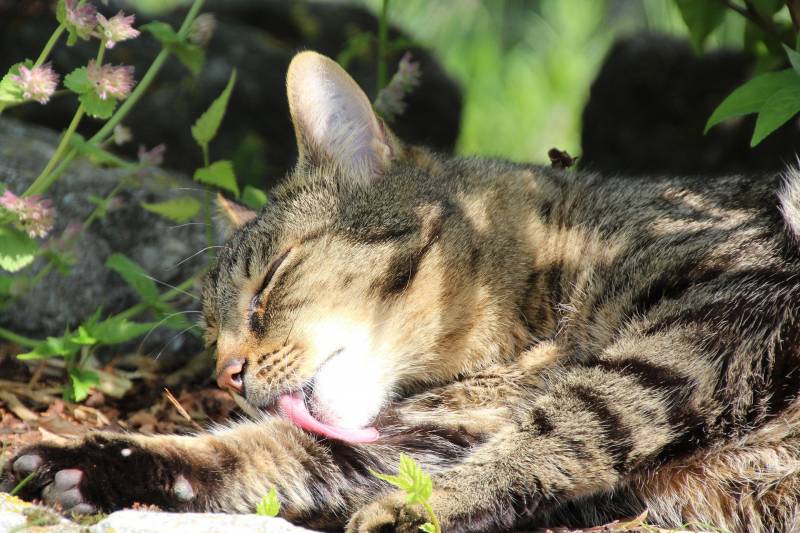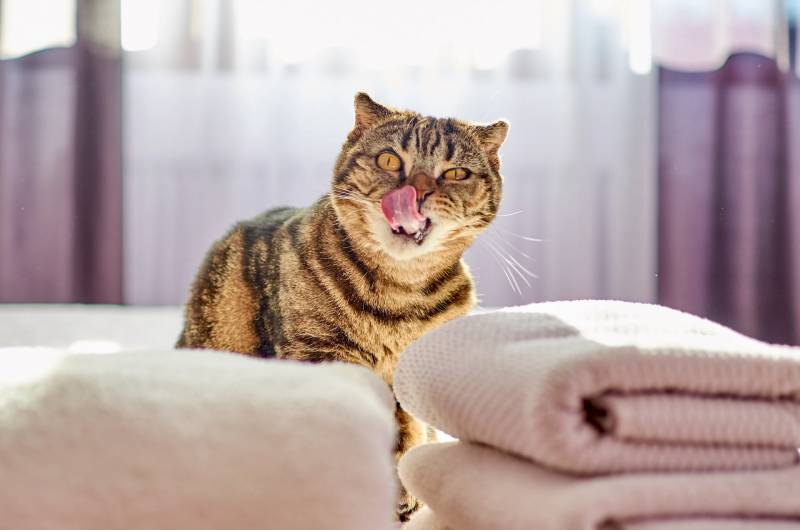Quick Navigation
Fleas are annoying pests that can cause a lot of damage to your home.
They can also spread diseases such as tapeworms and plague.
Fleas can even carry dangerous bacteria that can lead to serious health problems.
If you have cats in your home, then once in a while, you will have to use flea treatment on them.

Cats are great groomers, and if your cat feels something wet on her fur, she will lick it.
If you use an insecticide spray on your cat, they are not thrilled and make them uncomfortable.
It could potentially lead to some health issues, including poisoning.
Here Is What Will Happen If A Cat Licks Flea Treatment
1. Vomiting Or Diarrhea
Your cat may vomit or experience diarrhea after licking flea treatment off her coat.
The product’s bitter taste can cause an animal to salivate, foam at the mouth, feel queasy, or vomit if they are able to lick it while it is wet on their fur or if they scratch the area and then lick their foot.
These symptoms usually go away within 24 hours, but some cases last longer than this.
You must keep track of any vomiting or diarrhea so that you can contact your vet right away.
2. Seizures
Your cat could experience seizures after licking flea treatment—a seizure happens when too much activity goes through the brain.
The most common symptom of seizures is twitching, followed by convulsions.
Some other signs include drooling, staring into space, losing balance, falling over, stiffening up, and more.
You should take your pet to see your vet if he has experienced these types of seizures.
3. Lethargy
When your cat becomes lethargic, she will be less active and not want to play with toys or interact with people.
She may appear tired and sleepy all day long.
4. Loss Of Appetite
One sign that your cat has licked flea treatment is loss of appetite.
An appetite decrease means that your cat isn’t eating enough food. He may lose weight quickly, which makes him look thinner and sicker.
5. Lack Of Urination Or Constipation
Flea treatment poisoning can lead to dehydration or constipation in your cat.
Both urinating and defecating become difficult for your cat because her body doesn’t produce average urine or feces.
6. Difficulty In Breathing
If your cat accidentally licks flea treatment, it may experience difficulty breathing.
This is a common symptom if the product contains organophosphates.
Depending on the ingredients and dose the pet is exposed to, organophosphate toxicity can be quickly fatal.
Seek medical attention if this happens.
7. Death
In extreme cases, if your cat’s symptoms are not treated, due to large quantities of flea treatment your cat swallowed, toxicity may lead to seizures and death within a few hours.
Make sure that you don’t give your cat medications unless instructed to do so by your veterinarian.
8. Liver Disease
Pyrethrin and/or pyrethroid are ingredients in some topical sprays, dips, and shampoos for pets that treat flea and tick infestations.
When your cat’s liver is inefficient at processing permethrin a common pyrethroid, it can accumulate and cause poisoning or toxicity.
Cats who lick flea treatment off their coats can develop liver disease.
9. Cancer
If your cat licks flea treatment, the pesticides can accumulate in fatty tissues and organs over time, causing cancer.
The safe way to prevent your cat from getting poisoned by flea treatments is to make sure that you only apply the product directly onto your cat’s skin.
Never put the liquid on your cat’s paws or anywhere else where she can quickly ingest it. Also, never leave the treated area unattended while your cat is still using it.
Remember to always read the instructions carefully before applying the product. Read labels closely and follow directions strictly.
What Happens If My Cat Licks Frontline?
Frontline poisonings are very rare in cats.
The main active ingredient in Frontline is fipronil, which is not lethal if ingested.
The medication’s taste usually causes the most notable reactions.
If your cat does swallow some of the powder, here are some things that you need to watch out for:
1. Drooling
If a cat licks Frontline off her coat, she will drool foam-like saliva off her mouth due to the bitter taste even if your cat licks a cat-safe flea and tick medication
2. Vomit Or Diarrhea
Your cat may vomit or suffer from diarrhea after licking off the Frontline.
Symptoms typically disappear within one hour. But if it persists, it’s advisable to consult your vet.
3. Severe Stomach Pain
Your cat may also feel severe stomach pain and nausea after licking Frontline.
It could indicate a severe problem such as ulceration or internal hemorrhaging.
Call your vet right away in such a case.
4. Droopy Eyes
If your cat licks Frontline, he may have trouble focusing on her eyes.
She might feel tired and even close them completely.
5. Weakness
Your cat may start feeling weak and dizzy after licking Frontline. She may also seem disoriented and confused. She is just experiencing and adverse effect of the product due to its ingredients.
6. Unusual Behavior Changes
Your cat may act strangely and display unusual behavior changes following frontline ingestion.
For example, she may stop grooming herself or refuse to eat.

What Happens If My Cat Licks Worm Medicine?
When you suspect that your furry friend is suffering from worms or any other parasite) it would be best if you dewormed it as soon quickly as possible.
Among the worm medications available for cats today, Profender is among those that are most popular.
Being a topical solution, Profender is applied to cats’ skin.
Some pet owners wonder whether cats lick Profender by mistake, so could it cause health problems if ingested?
If the cat licks up worm medicine in small amounts, there’s nothing much to worry about.
But if the ingestion was, in excess, watch out for the following signs.
1. Abdominal Cramps
Although rare, some cats may experience adverse reactions such as these cramping pains happening in the abdomen region.
It feels similar to having gas bubbles trapped in your intestines.
2. Nausea
Your cat may experience nausea and vomiting after licking off worm treatment due to having a lot of worms.
3. Loss Of Appetite
Your cat will lose interest in eating food when licking excess worm treatment though this symptom is uncommon some cats may experience this within the first 24 hours.
It will resolve spontaneously.
4. Lethargic/Weak
Your cat may appear lethargic and weak after excess worm treatment
5. Fainting
Excessive licking of worm medicine can cause a fainting episode that occurs when your cat loses consciousness suddenly.
What Can You Do If Your Cat Licks Flea Treatment?
If your cat has ingested any poisonous substance, there are several ways to treat this situation.
The first thing that you should do is contact your vet immediately.
They will advise you on what steps to take next. Some common remedies include:
Keep Them Lots Of Water
If the cat experiences excessive drooling due to flea treatment ingestion, keep giving them water to stay hydrated and wash the taste off her mouth, water or tuna to help her dilute the stuff and mod
Allergy Shot
If your cat has developed a severe reaction after licking e Frontline or any other flea treatment, in some, your cat may need an allergy shot to counteract an allergic reaction to the medication,
Activated Charcoal
This natural remedy works by absorbing toxins from the body. It helps remove poisons from the digestive tract.
Gastric Lavage
In more complicated situations, she may require hospitalization to flush toxins from her system and stabilize her.
The procedure involves inserting a tube into your cat’s mouth and down through its esophagus.
Then, water is poured into the stomach via a syringe until all the contents are removed.
Antidote Medication
There are certain medications available at pet stores that help neutralize the effects of toxic substances.
Final Thought
In case of flea treatment poisoning, it is advisable to watch out for the signs to seek treatment.
Cats can recover from fleas or worm treatment poisoning.
But it’s better to avoid the problem altogether.
Try using only products intended for cats only on the prescribed amount.
Also, apply the medication in the correct place and keep pets separated while applying the drug to avoid licking each other.

Zoey is a long-time pet owner and animal rights advocate, a vital part of Purrfect n’ Pawesome. She shares her unique experiences and learnings with her readers to enhance their understanding of pet behavior and nutrition. Along with being an active pet writer, she volunteers at multiple animal shelters, rescue centres with some bespokenly awesome pets.
Zoey has a lot to share when raising the pets and spending life being their true friends. She has a quite pampered Persian cat and a Ragdoll, whom she loves the most. Readout her blogs to know more about being a responsible parent to your beloved pets.
“I love to be around cats and dogs; that’s my passion and my trick to get away from all the negativity and soaking in unconditional love and affection. Being attached to this platform gives me the reason to be vocal about pet love, care, and nurturing. Although I am not an expert or veterinarian by any means, I have a lot of experience and learnings to share with my fellow readers.”
